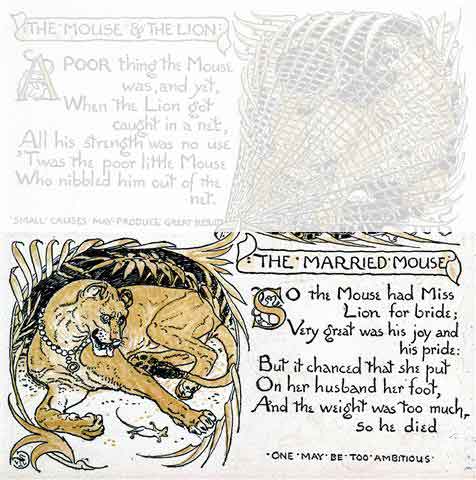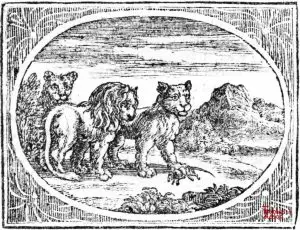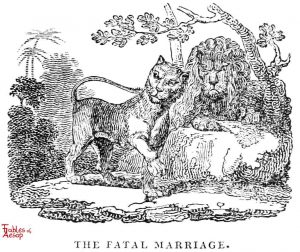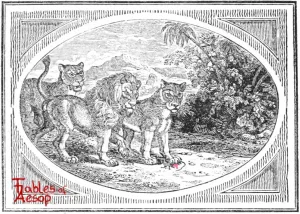A mouse married a lion but regrets doing so when the lion steps on the mouse.
One may be too ambitious
[Note: In some collections, the mouse is proposing marriage to the lion it has just saved from a net and is thus a follow-up to The Lion and The Mouse as seen in the JBR Collection.]

JBR Collection
It is said that the Mouse spoken of in the last Fable was so emboldened by the offers of friendship made to him by the Lion in return for his assistance, that he asked for the hand of his daughter in marriage. The Lion, amused at the request, good-humouredly told the Mouse he should plead his own cause, and called the young Lioness to come to him. She, bounding forward heedlessly, did not see her little lover, who was running to meet her, and one of her paws falling upon him, he was crushed to pieces.

Samuel Croxall (The Fatal Marriage)
THE Lion aforesaid, touched with the grateful procedure of the Mouse, and, resolving not to be outdone in generosity by any wild beast whatsoever, desired his little deliverer to name his own terms, for that he might depend upon his complying with any proposal he should make. The Mouse, fired with ambition at this gracious offer, did not so much consider what was proper for him to ask, as what was in the power of his prince to grant; and so, presumptuously demanded his princely daughter, the young Lioness, in marriage. The Lion consented: but, when he would have given the royal virgin into his possession, she, like a giddy thing as she was, not minding how she walked, by chance set her paw upon her spouse, who was coming to meet her, and crushed her little dear to pieces.
THE APPLICATION
This fable seems intended to show us, how miserable some people make themselves by a wrong choice, when they have all the good things in the world spread before them to choose out of. In short, if that one particular of judgment be wanting, it is not in the power of the greatest monarch upon earth, nor of the repeated smiles of fortune to make us happy. It is the want of possession of a good judgment, which oftentimes makes the prince a poor wretch, and the poor philosopher completely easy. Now, the first and chief degree of judgment is to know one’s self; to be able to make a tolerable estimate of one’s own capacity, so as not to speak or undertake any thing which may either injure or make us ridiculous: and yet (as wonderful as it is) there have been men of allowed good-sense in particular, and possessed of all desirable qualifications in general, to make life delightful and agreeable, who have unhappily contrived to match themselves with women of a genius and temper necessarily tending to blast their peace. This proceeds from some unaccountable blindness: but when wealthy plebeians of mean extraction, and unrefined education, as an equivalent for their money, demand brides out of the nurseries of our peerage, their being despised, or at least overlooked, is so unavoidable, unless in extraordinary cases, that nothing but a false taste of glory could make them enter upon a scheme so inconsistent and unpromising.

Thomas Bewick (The Fatal Marriage)
A Mouse being ambitious of marrying into a noble family, paid his addresses to a young Lioness, and at length succeeded in entering into a treaty of marriage with her. When the day appointed for the nuptials arrived, the bridegroom set out in a transport of joy to meet his beloved bride; and coming up to her, passionately threw himself at her feet; but she, like a giddy thing as she was, not minding how she walked, accidentally set her foot upon her little spouse, and crushed him to death.
APPLICATION.
It is very unsafe for persons of low estate to form connections with those of a very superior situation. When wealthy persons of mean extraction and unrefined education, as an equivalent for their money, demand brides out of the nursery of the peerage, if they should not be ruined by the giddy extravagance of their high-born wives, their being despised, or at least treated with neglect, is almost certain. But indeed, much unhappiness follows the want of a sound judgment in the choice of a partner for life, whether it be in high or low, rich or poor. No human contract is of so important, as well as delicate a nature, as marriage. It is one of the grand epochs in the history of a man. It is an engagement which should be voluntary, judicious, and disinterested, and can never be attended with honour, or blessed with happiness, if it has not its origin in mutual affection. If it be either unsuitable or compulsory, it produces not only individual misery, but consequences universally pernicious. Sordid interest and vile dependence may indeed sometimes act so powerfully, as to set nature and true convenience aside, so as to make the yoke which is jointly borne by the improper union of the high and low, or by age and youth, put on an appearance of regard for each other; but natural affection must needs be wanting on one side or the other. Nature has, however, with a strong hand, pointed out the path to be pursued, and a few prudential rules only are necessary to keep us within it. If a man is of an unsound constitution, or if he cannot provide for a family, let him forbear matrimony: it is the duty of every man who marries, to take a healthy woman for his wife, for the sake of his children, and an amiable one, for his own comfort. The same precaution ought to be taken by the fair sex, unless they can make up their minds to become nurses to tainted worn-out husbands, and their puny nerveless offspring.


Crane Poetry Visual
So the Mouse had Miss Lion for bride;
Very great was his joy and his pride:
But it chanced that she put
On her husband her foot,
And the weight was too much so he died.
One may be too ambitious.


